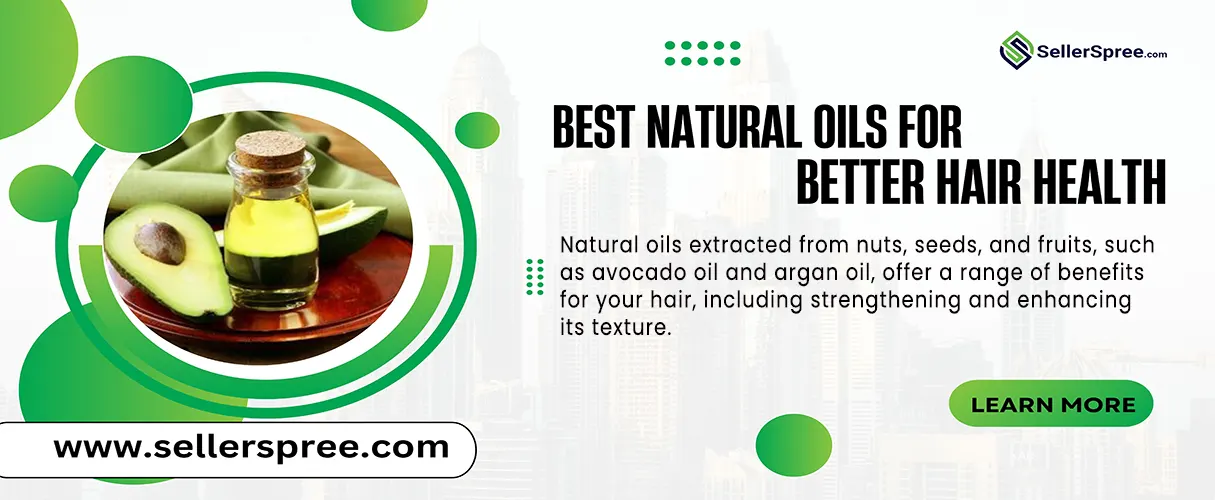
Shop Now: www.sellerspree.com
Natural oils extracted from nuts, seeds, and fruits, such as avocado oil and argan oil, offer a range of benefits for your hair, including strengthening and enhancing its texture. They are often sought after for their ability to address issues like dryness, dullness, and damage. These oils can also help moisturize your scalp, potentially reducing dandruff.
How to Use Natural Oils for Hair
There are various ways to incorporate oils into your hair-care routine:
- Add a few drops to your shampoo or conditioner.
- Apply several drops to damp hair ends before blow-drying or styling.
- Warm 1 to 2 tablespoons of oil, massage into your hair, and leave for 30 minutes before washing.
Choosing the Right Oil for Your Hair Type
- Coconut Oil: Best for hair repair, thanks to its lauric acid content, which can penetrate and repair damaged hair.
- Olive Oil: Ideal for conditioning, it can penetrate hair fibers deeply, though use sparingly to avoid a heavy look.
- Argan Oil: Particularly useful for dyed hair, as it helps protect against damage from oxidative dyes.
- Jojoba Oil: Great for thinning hair, as it reduces protein loss and breakage.
- Avocado Oil: Perfect for smoother, shinier hair, thanks to its fatty acids and minerals that seal the hair cuticle.
- Sweet Almond Oil: Offers UV protection and treats dryness and dullness without weighing hair down.
- Grapeseed Oil: Excellent for frizz and split ends, especially for fine hair.
- Macadamia Nut Oil: Ideal for manageability and repairing heat-damaged hair.
- Baobab Oil: Great for curly hair, enhancing elasticity and shine.
- Rosemary Oil: May promote hair growth and is effective against dandruff.
- Tea Tree Oil: Effective in treating dandruff due to its antimicrobial properties.
How to Use on regular basis?
Using a small amount of hair oil daily is a great way to nourish dry and damaged hair.
Step 1: Take 3-5 drops of your chosen hair oil and rub it between your palms and fingers.
Step 2: Apply the oil to the mid-lengths and ends of your hair to replenish lost moisture.
Step 3: Gently massage the oil into your hair in a circular motion to seal the cuticle and promote smoothness.
Step 4: Leave the oil on for about 30 minutes, then rinse with cold water.
Say goodbye to hair fall and hello to a convenient and effective anti-hair fall solution that leaves your hair feeling amazing and boosts your confidence every day!
The Science Behind Hair Growth Oils:
Hair oil serves as an emollient, meaning it softens and moisturizes the hair. While there are various types of hair oils, the most common ones are derived from natural, plant-based ingredients.
Maintaining a healthy, hydrated scalp is essential for promoting healthier hair growth. Hair oil can aid in enhancing scalp health by providing vital nutrients and moisture. Additionally, massaging the scalp with hair oil can boost blood circulation, which further stimulates hair growth.
In terms of hair growth recovery, data comparing Minoxidil with peppermint oil and jojoba oil suggests that peppermint oil could be a viable alternative to Minoxidil. Although the study was short-term and not conducted on humans, it indicates that peppermint oil warrants further exploration.
Rosemary oil is another option supported by scientific evidence. Laboratory studies have shown that it can enhance blood circulation to the scalp and promote hair growth. In a human study, rosemary oil demonstrated a significant increase in hair follicle number and growth rates, outperforming Minoxidil with almost double the number of follicles and fewer side effects.
Similarly, cedarwood oil has been found to reduce DHT levels in the scalp. DHT is a hormone linked to hair loss, so reducing its levels can help slow down or prevent hair loss.
TAGS: SellerSpree, Best Natural Oils, Best Shampoo, Hair Color, Beauty Supplies, Salon Supplies, Barber, Cosmetologist Supplies, Cosmetics, Hairspray, Dry Shampoo, Conditioner, Permanent Hair Dye, Semi Permanent Hair Dye, Creams, Moisturizer, Serum, Buy Online, Shopping, USA
